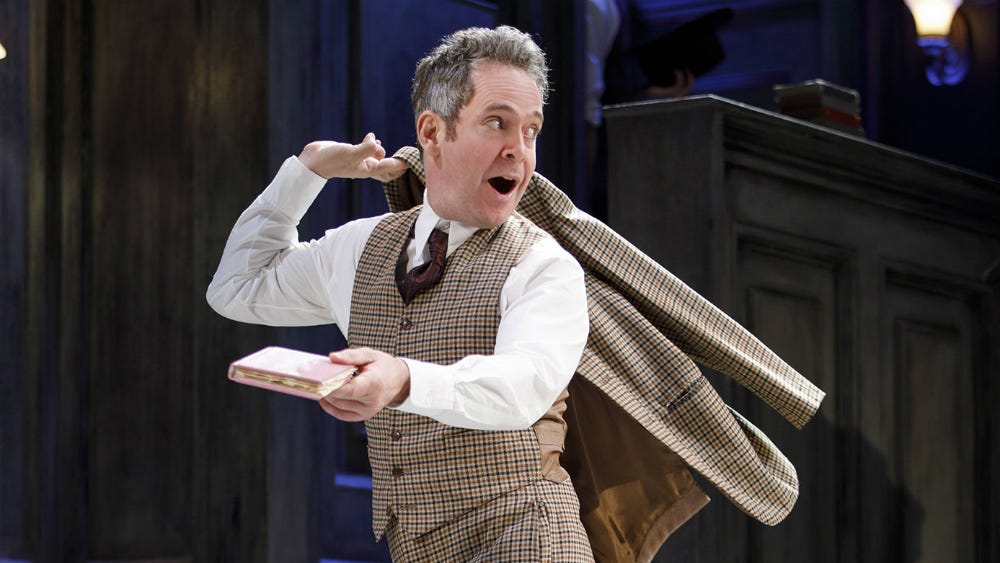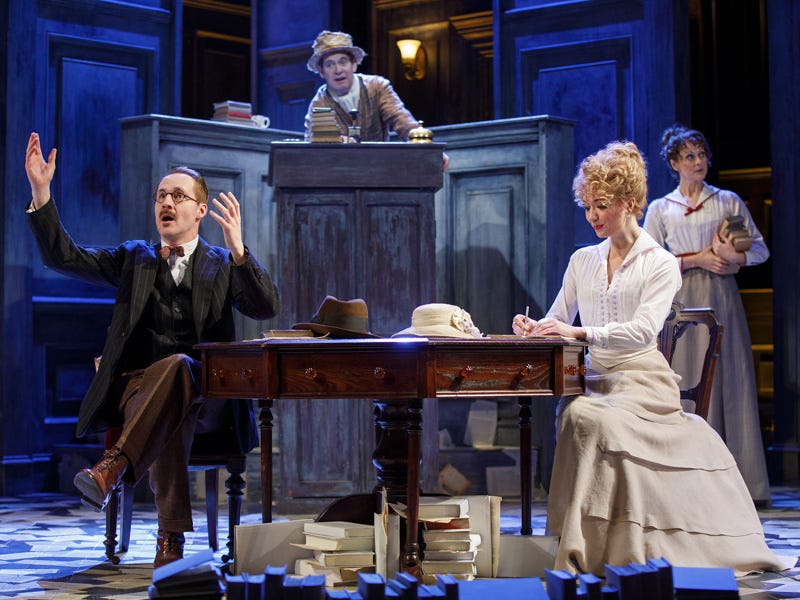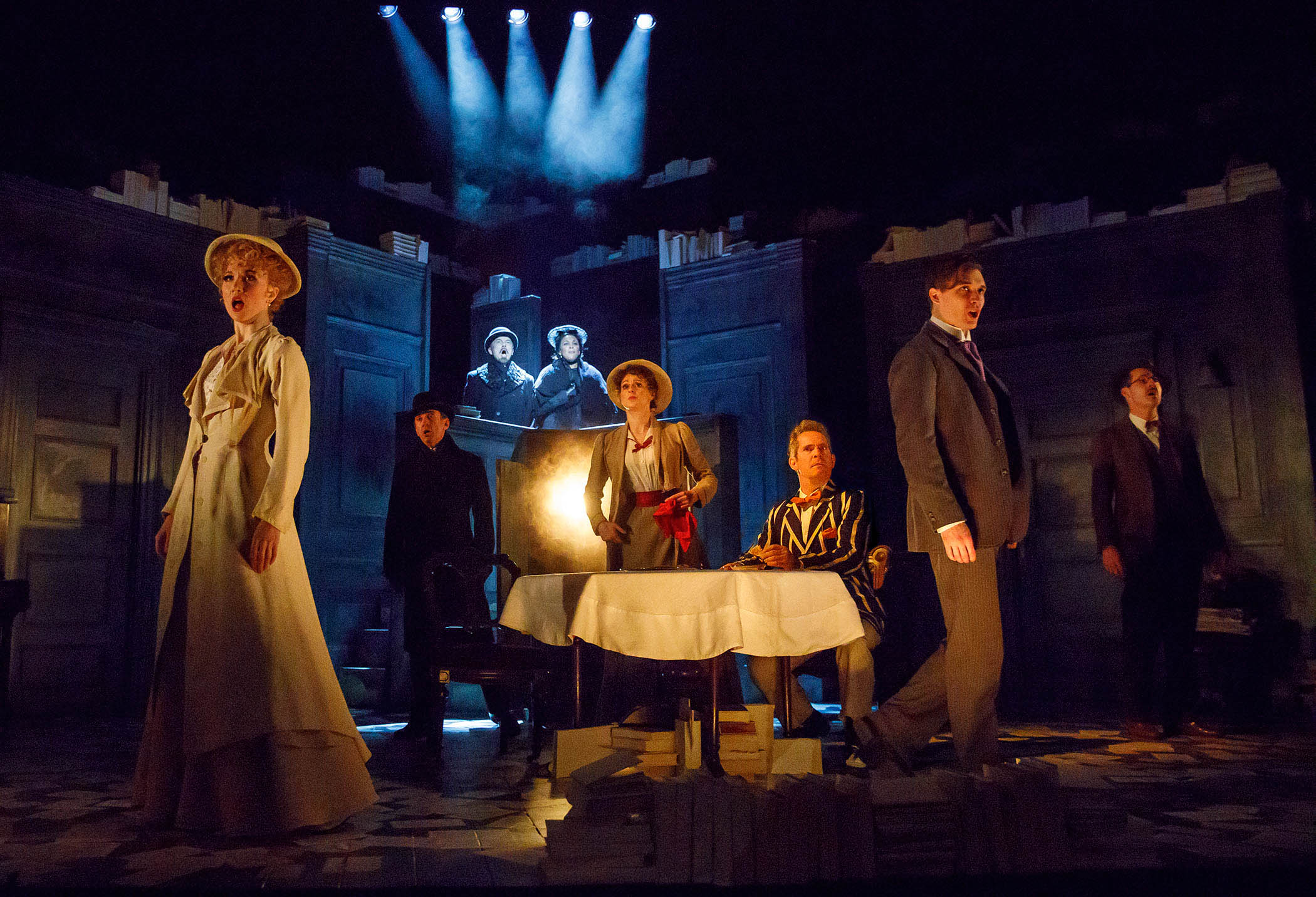No one ever said that a Tom Stoppard play is for the faint of heart; you must pay attention, understand the references, and keep track of endless moving parts and plot lines. That being said, Roundabout’s production (from the Menier Chocolate Factory) of “Travesties,” which opened at the American Airlines Theatre on Tuesday, is surprisingly palatable, even digestible, a rare word to describe the dense Stoppard drama. But Patrick Marber’s production keeps things light, rapidly-paced, and comedic; it embraces fragmentation and excess and turns it into a non-stop party.
For those unfamiliar with the expansive Stoppard piece, “Travesties” is a memory piece told by Henry Carr (Tom Hollander), the British consul in Switzerland, of his (often incorrect) recollections of a brief period in 1917 when he interacted with Vladimir Lenin (Dan Butler), James Joyce (Peter McDonald), and Tristan Tzara (Seth Numrich). Using the word “founder” loosely, each man founded a major movement: Russian communism, British modernism, and European Dadaism. Carr interacts with these three iconic men in a public library in Geneva and develops a friendship with each of them. Most notably, he is given a part of Algernon (or as he calls him “the other one”) in a James Joyce-led, English Players production of Wilde’s “The Importance of Being Earnest.”
If you seem confused by that brief introduction, you are probably feeling the intended effect of the play. In every way, “Travesties” is confounding. It is a memory play that is jumbled, confused, and repetitious: as Carr struggles to recall his interactions the same scenes play over and over again with slight variations. To make matters worse — or better depending on if you are a diehard Wilde fan like I am — many of Carr’s memories are marred with dialogue from “The Importance of Being Earnest.” But to an untrained ear, it is impossible to know when Carr, Lenin, Joyce, and Tzara are speaking their conversations or regurgitating Oscar Wilde.
To continue this spiral into the palimpsestuous mind of Carr, two characters in the play, Cecily and Gwendolen, are taken directly from “The Importance of Being Earnest,” but they are also real people; Cecily (Sara Topham) is the local librarian and Gwendolen (Scarlett Strallen) Carr’s sister. Also in the mix are Carr’s not-so-secretly socialist butler, Bennett (Patrick Kerr), and Lenin’s wife Nadya (Opal Alladin).
Unsurprisingly, in a group this of literary, political, and cultural elites, conversations are rather intellectual, riddled with references, allusions, uncited quotations, and never-ending strings of alliterative adjectives. On the surface, the complexity of the text and the overly academic style of the dialogue could make this play a slog for the audience. But thankfully the Patrick Marber has devised a version of “Travesties” that clips along at light speed. We cannot understand it all, and for once we are not meant to. Every ingenious little literary Easter egg Stoppard hid in the text is spoken readily. Of anything, the production satirizes the overly academic nature of the play and turns the would-be elitism into comedy.

At the center of course is Tom Hollander, who performs not only as the sprightly Henry Carr of 1917 but also an aged, senile version years later struggles to recall his past. Although Hollander’s performance is certainly noteworthy and he does carry the show, he is outshined by some of his more comedic costars. In particular, Seth Numrich as Tzara steals every scene he is in, perfectly portraying the wacky Dadaist who was famous for cutting up Shakespeare sonnets, putting the scraps in a hat, and pulling out a new poem. Numrich is wild and child-like, and all his arguments about art end in him screaming “dadadadada” in such a way that is it always hilarious. McDonald’s Joyce is so comedically uptight he makes a perfect scene partner for Numrich. On the other end of the spectrum is Butler’s laser-focused Lenin. All three men are ready to change the world, and in this play, we are more than happy to laugh at their hubris, seriousness, and unintended elitism.
The men of “Travesties” are certain hilarious and each give an amazing portrait of their real-life characters, but it is the women of the play who are the true comedy geniuses. Just like in “The Importance of Being Earnest,” the women have the best parts. Scarlett Strallen and Sara Topham (re)interpret the Wilde characters in a delicious new way. The men in their lives may be changing the world, but they are doing all the work behind the scenes. Both actresses give what might be the most comedic performances of the season. Stoppard’s version of the infamous garden Cecily-Gwendolen confrontation scene is a musical number inspired by a vaudeville song, but even without this list of references, the scene is show-stopping. Rarely in a play does a scene end with thunderous applause, but after their masterful and hilarious song-scene Strallen and Topham certain earn an ovation.

To help establish the world of confused memories, allusions, and intertexts, set and costume designer Tim Hatley created a maze of books and papers and folios and teacups and even some tasteful taxidermy pieces. Lighting by Neil Austin helped us seamless transition from frame narration to memory and sound, and original music by Adam Cork helped denote the resetting of a scene or memory, denoted by the sound of a library help desk bell.
“Travesties” is certainly the most pleasantly surprising revival this season; instead of a dated, elitist, hard to understand the play, Patrick Marber and his extraordinary cast have managed to strike comedy gold.






